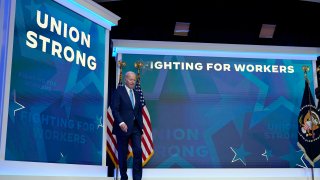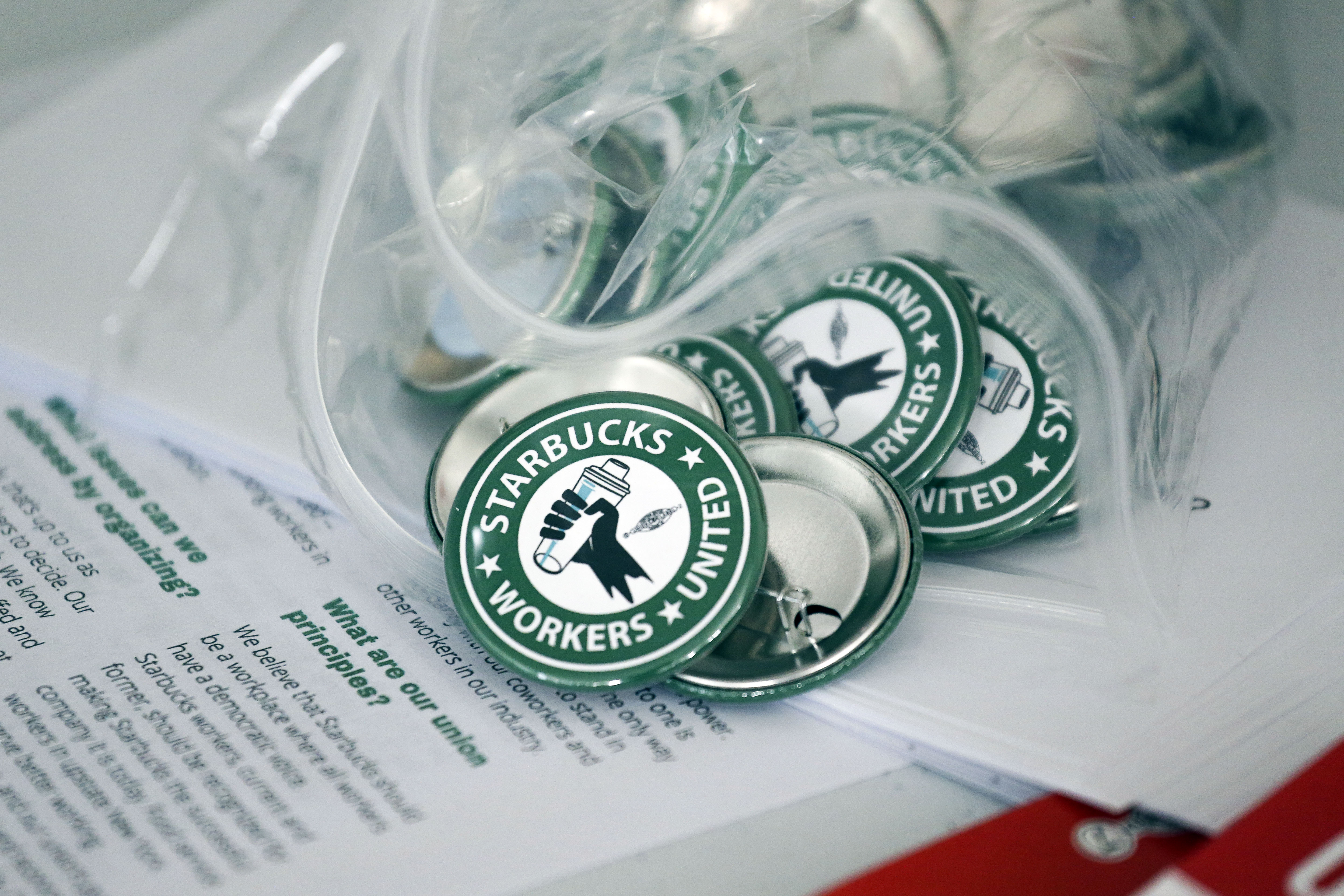
Joe Biden likes to say he's the most pro-union president in U.S. history. When he announces his expected reelection campaign in the coming weeks, he'll get the chance to prove it to his own staffers.
Workers on his 2024 campaign will be unionized, political allies say, making him the first president to run a reelection campaign with staff represented by a union. That means hammering out a collectively bargained agreement that could establish salary minimums, set work hours and offer overtime pay, among other things, easing the demands on a workforce that has historically been required to put in long hours for meager pay and guaranteed joblessness after Election Day.
The move allows Biden to further demonstrate to his base just how deep his pro-labor convictions are, providing a strong contrast with his Republican opponents, whose staffers aren't likely to embrace unionizing. It also means extra work for those at the top of Biden's campaign to negotiate a contract and could present financial and workforce constraints, but union organizers and Democratic operatives insist that having a unionized staff would only make Biden's 2024 bid stronger.
“The marquee name, the person who’s running, wants the cred for being union,” said Janice Fine, a Rutgers University professor of labor studies and employment relations and director of the workplace justice lab@RU. “But the people who are running the campaign are going to have more trepidation because they know what it takes to actually lift up a campaign.”
It's not unprecedented for a presidential campaign to be unionized, though Biden's would be the largest unionized workforce by far. Democratic White House candidates Bernie Sanders, Elizabeth Warren and Julián Castro had unionized campaign staffs in 2020. Even Biden’s campaign unionized after clinching that year’s Democratic nomination. The Democratic National Committee’s staff is also unionized
Former President Donald Trump's 2024 campaign staff hasn't unionized. The staffs of top Republicans thought to be readying presidential runs, including Florida Gov. Ron DeSantis, probably won't, either.
“In the old days, there were definitely Republicans who were pro-union," Fine said. “But not now.”
Biden’s 2020 campaign only unionized that May, when it reached an agreement with field organizers represented by the Iowa-based Teamsters Local 238. As entry-level campaign employees, field staffers are often dispatched to different states. Their agreement established a six-day workweek, a $15-per-hour minimum wage and overtime for working more than 40 hours weekly.
This time, Biden’s campaign will unionize earlier in the process and may face pressure to apply the contract to more staffers, including some at its headquarters, given that the president's administration has launched efforts to increase labor organization membership nationwide. Biden has hosted union organizers in the Oval Office, and the White House is paying interns for the first time since the 1970s.
Get a weekly recap of the latest San Francisco Bay Area housing news. Sign up for NBC Bay Area’s Housing Deconstructed newsletter.
“I told you I was going to be the most pro-union president in history," Biden said recently. “And I’ve kept my promise.”
Biden is expected to announce a reelection campaign as soon as next month, after the first-quarter fundraising period concludes at the end of March.
A top adviser, who spoke on the condition of anonymity to more freely discuss a reelection campaign that hasn't yet formally begun, said the campaign’s 2020 union contract won't really be applicable to any contract the reelection campaign reaches for 2024. That's because the division of labor is vastly different for staffers on a sitting president's reelection campaign compared with the campaign of a candidate clinching a contested primary.
Most reelection campaign staffers will work for different state Democratic parties around the country and have their own union contracts with them. Or they will be DNC staffers covered by the committee’s own union agreement, the adviser said. Some 2024 national campaign staffers will be covered under a new union contract, but it may not apply to many working at headquarters who are part of management, the adviser said, adding that the scope of who would be covered under a union contract is among the questions that will be sorted out once the campaign formally launches.
The Biden adviser said that the reelection campaign would start with a relatively small staff that grows over time and that it will begin work before a union contract has been reached.
While acknowledging that unionization is still a requirement for Democratic campaigns that Republican ones do not have to worry about, the adviser said Biden's reelection campaign expects to be able to take having a unionized workforce "in stride” and reach an agreement that properly supports staffers and lives up to the president's pro-labor beliefs.
Outside Biden's inner political circle, however, expectations will be higher.
Unionizing by Democratic campaigns up and down the ballot goes far beyond the president, having become far more common in recent cycles — especially last fall's midterms. Taylor Billings, organizing director for the Campaign Workers Guild, said her union has represented workers from more than 60 political firms and campaigns since its founding in 2017.
The guild has won negotiated benefits including bonuses for election wins, severance pay and health care coverage that extends past Election Day. Some past discussions have focused on things as basic as having running water in workspaces, Billings said.
She said some ardent supporters have disparaged the idea of a top candidate’s campaign unionizing, with the fear being that it will make it tougher to win elections — a dynamic she said is likely to intensify in a presidential race.
“It makes the pretty common talking point of ‘Do nothing to sabotage the race’ more seductive, although it’s not more true,” Billings said. “The reality is that presidential campaign workers are in a pretty unique position to make the lives of many workers on the campaign much better and set a standard for the industry.”
Faiz Shakir, Sanders’ 2020 campaign manager, oversaw a staff of 1,200 across the country by January of that year, represented by the United Food & Commercial Workers Local 400. He said most employees routinely worked five days a week early in the campaign, then shifted to six- and seven-day workweeks as the primary progressed — all of which were part of the contact.
“The discourse around unionized work environments, there’s this mythology that you are a five-day workweek, 40-hours-a-week worker,” Shakir said. “But if you look at a lot of union contracts, they allow and build in the need for labor to be extended beyond normal work hours.”
Warren’s 2020 campaign contract calculated 60-hour workweeks. The Sanders campaign contract dictated that staffers working eight hours or more got two 15-minute breaks and a 30-minute paid lunch period.
Sanders staffers working 12 hours or more got four 15-minute breaks and a 30-minute lunchbreak. Anyone working 16 consecutive hours would get a 12-hour rest period before starting again. It also gave staffers the right to request time off “blackout days” of up to three days in a row, though such requests were limited as big elections approached, Shakir said.
Despite that, some Sanders campaign staffers complained that they weren’t paid the $15 per hour the candidate was pushing to mandate nationwide. Shakir said managers of other Democratic presidential campaigns nonetheless asked to see the Sanders contract so they’d have a better understanding of what to expect when their own staffs embraced unionization.
“As a pro-union campaign, we believed that, if you do this the right way, the campaign’s going to be stronger as a result,” Shakir said. “Because the staff feel like you haven’t been burned out, you have rights.”



